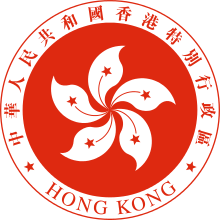Second term of Tung Chee-hwa as Chief Executive of Hong Kong
| Second Tung Chee-hwa Government | |
|---|---|
|
2nd cabinet of Hong Kong Special Administrative Region | |
.jpg) | |
| Date formed | 1 July 2002 |
| Date dissolved | 12 March 2005 |
| People and organisations | |
| Head of government | Tung Chee-hwa |
| Head of state |
Jiang Zemin (until 2003) Hu Jintao (since 2003) |
| Number of ministers | 14 |
| Status in legislature | Pro-Beijing camp |
| Opposition party | Pro-democracy camp |
| History | |
| Election(s) | 2002 Chief Executive election |
| Legislature term(s) |
2nd Legislative Council 3rd Legislative Council |
| Predecessor | First Tung government |
| Successor | First Tsang government |
The Second term of Tung Chee-hwa as Chief Executive of Hong Kong, officially considered part of "The 2nd term Chief Executive of Hong Kong", relates to the period of governance of Hong Kong since the transfer of sovereignty of Hong Kong, between 1 July 2002 and 12 March 2005 until Tung Chee-hwa resigned from the office and the rest of the term was taken up by former Chief Secretary for Administration Donald Tsang.
Cabinet
Under the Principal Officials Accountability System introduced by Tung Chee-hwa in July 2002, there were 3 Secretaries of Department and 11 Directors of Bureau. Under the new system, all heads of bureaux became members of the Executive Council, and came directly under the Chief Executive instead of the Chief Secretary or the Financial Secretary.
Ministry
Two major officials under serve criticisms resigned during the political crisis in July 2003: Financial Secretary Antony Leung resigned in July after the "Lexusgate" scandal and Secretary for Security Regina Ip after the controversial Hong Kong Basic Law Article 23 legislation.
Executive Council non-official members
The Executive Council was headed by Chief Executive and with total of 19 members: 3 secretaries and 11 directors of the bureaux as official members and 5 non-official members. All non-official members except for Convenor Leung Chun-ying was newly appointed by Tung Chee-hwa.
Tung allied himself with the Democratic Alliance for the Betterment of Hong Kong (DAB) and the Liberal Party,[1] by appointing chairmen of the Liberal Party and DAB, James Tien and Jasper Tsang Yok-sing to the Executive Council to form a "ruling alliance."[2]
On 5 July 2003, James Tien resigned from the ExCo to show objection to the legislation of Hong Kong Basic Law Article 23, after more than 5 millions people marched on 1 July. Tung later on appointed Selina Chow, also from the Liberal Party to replace Tien.
In October 2004, Tung appointed two additional non-official members to the Executive Council.
| Members | Affiliation | Portfolio | Took Office | Left Office | Ref | |
|---|---|---|---|---|---|---|
| Leung, CYCY Leung | Nonpartisan | Non-official Convenor of the ExCo; Chartered surveyor |
1 July 1997 | Tsang I | ||
| Tsang, JasperJasper Tsang | DAB | Legislative Councillor | 1 July 2002 | Tsang I | ||
| Cheng, Yiu-tongCheng Yiu-tong | FTU | General secretary of FTU | 1 July 2002 | Tsang I | ||
| Liao, AndrewAndrew Liao | Nonpartisan | Former deputy judge of High Court | 1 July 2002 | Tsang I | [3] | |
| Tien, JamesJames Tien | Liberal | Legislative Councillor | 1 July 2002 | 5 July 2003 | ||
| Chow, SelinaSelina Chow | Liberal | Legislative Councillor | 22 September 2003 | Tsang I | ||
| Cha, LauraLaura Cha | Nonpartisan | Non-executive deputy chairman of HSBC | 19 October 2004 | Tsang I | [4] | |
| Chan, BernardBernard Chan | Alliance | Businessman and politician | 26 October 2004 | Tsang I | ||
See also
- First term of Tung Chee-hwa as Chief Executive of Hong Kong
- First term of Donald Tsang as Chief Executive of Hong Kong
References
- ↑ Staff reporter (13 June 2002). "Tung set to strengthen power base". The Standard. Retrieved 23 July 2008.
- ↑ Michael DeGolyer (1 January 2003). "Stating the obvious". The Standard. Retrieved 11 January 2007.
- ↑ "The Honourable Andrew LIAO Cheung-sing, GBS, SC, JP". Executive Council. Retrieved 2 May 2013.
- ↑ "The Honourable Mrs Laura CHA SHIH May-lung, GBS, JP". Executive Council. Retrieved 2 May 2013.
| Preceded by Tung I |
Government of Hong Kong 2002–2005 |
Succeeded by Tsang I |
